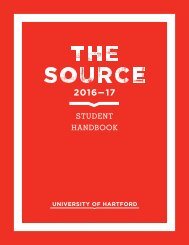advising
Create successful ePaper yourself
Turn your PDF publications into a flip-book with our unique Google optimized e-Paper software.
ADVISING HANDBOOK FOR FIRST-YEAR STUDENTS<br />
College of Engineering,<br />
Technology, and Architecture<br />
Engineering Students<br />
Engineering students are not required to declare their major until<br />
the end of the first year. The first year is identical for all engineering<br />
students, except the acoustics and music students. Students who<br />
require special consideration with respect to mathematics placement<br />
and English as a second language may also be assigned a course<br />
schedule different from that illustrated on the work sheet. These<br />
students will be informed either in their letter of acceptance or<br />
during the academic <strong>advising</strong> program during Orientation.<br />
Basic Requirements<br />
All first-semester engineering students, except acoustics and music<br />
majors, are required to register for the following courses:<br />
ES 101 Engineering Freshman Dialogue<br />
ES 143 Engineering and Design<br />
WRT 110 Academic Writing I<br />
M 144 Calculus I (if precalculus completed<br />
in high school)<br />
ES 220 Graphic Communication<br />
or ES 115 Engineering Computer Applications<br />
If you have transfer credits, you may have already satisfied some<br />
of these course requirements. You may also have completed some of<br />
these courses under special Advanced Placement (AP) programs at<br />
your high school (see page 5). See your advisor at Orien ta tion.<br />
All engineering students, with the exception of computer<br />
engineering, have the option of choosing ES 115 Engineering<br />
Computer Applications or ES 220 Graphic Communication for the<br />
first semester. Computer engineering students must take ES 220<br />
Graphic Communication.<br />
All first-year students are required in the first semester to take<br />
either an AUC course in the arts (AUCA) or an AUC course in<br />
other cultures (AUCC).<br />
Engineering students may not select AUCT courses. The list of<br />
AUC courses in each category is on pages 9–12.<br />
Acoustical Engineering and Music<br />
The required first-semester curriculum for acoustics and music<br />
majors is as follows:<br />
ES 143 Engineering and Design<br />
WRT 110 Academic Writing I<br />
M 144 Calculus I<br />
TH 111 Harmony I*<br />
TH 120 Elementary Ear Training I<br />
Private music lesson<br />
Performing organization<br />
* Students may be required to take the prerequisite to this course, TH 110<br />
Fundamentals of Music Theory, depending on their audition results. Red Caps will<br />
escort students to The Hartt School for scheduling of their private music lessons. At<br />
that time, they will either (a) be told of their aural placement test results (for those<br />
who auditioned in person) or (b) be administered an aural placement test at that<br />
time (for those who mailed an audition tape).<br />
Course Descriptions<br />
ES 101 Engineering Freshman Dialogue [1]<br />
Engineering students meet as a unit weekly throughout the fall<br />
semester. Students are introduced to many of the campus resources,<br />
academic issues, and special programs available to them. Guest<br />
speakers discuss engineering careers and opportunities. Required of<br />
all first-year engineering students. (Grading: P/NP)<br />
ES 115 Engineering Computer Applications [3]<br />
The formulation and solution of engineering problems using<br />
a computer. The development of structured programs to solve<br />
engineering problems using a compiled language. The use of<br />
mathematical computer packages to solve engineering problems.<br />
Required of all first-year engineering students. Laboratory fee.<br />
ES 143 Engineering and Design [3]<br />
Introduction to the fundamentals of engineering, the engineering<br />
profession, and engineering design, with emphasis on guided-design<br />
and problem-solving methodologies. Students undertake practiceoriented<br />
group design projects. Formal written reports and oral<br />
presentations are required. Required of all first-year engineering<br />
students.<br />
ES 220 Graphic Communication [2]<br />
Fundamental concepts of graphic communication, with an objective<br />
of attaining the ability to visualize and draw in three dimensions.<br />
Using freehand sketching and mechanical tools, students are taught<br />
geometric construction, orthographics, isometrics, dimensioning,<br />
sectioning; no drawing ability required. Required of all engineering<br />
students. Open to all University students.<br />
M 144 Calculus I [4]<br />
Functions, limits, continuity, differentiation of algebraic and<br />
trigonometric functions, applications of derivatives; definite integrals;<br />
approximate integration; and applications of the definite integral.<br />
Only 1 additional credit given to students who have received credit<br />
for M 112. Prerequisite: M 140.<br />
M 145 Calculus II [4]<br />
Techniques of integration, indeterminate forms, improper integrals,<br />
infinite sequences and series, and separable differential equations.<br />
Prerequisite: M 144.<br />
TH 111 Diatonic Harmony I [2]<br />
The first course in tonal harmony, covering the principles of diatonic<br />
harmony. Topics include diatonic chord progression, melody<br />
harmonization, and figured bass. Study of examples from the classic<br />
and popular music literatures. Three hours weekly. Prerequisite:<br />
TH 110 or placement exam.<br />
PHY 112 Calculus-Based Physics I [4]<br />
This is the first part of a three-semester course in introductory<br />
physics intended for students majoring in the physical sciences<br />
or in engineering. The subject matter is the study of Newtonian<br />
mechanics. Prerequisite: M 144 (may be taken concurrently).<br />
Laboratory fee.<br />
32



